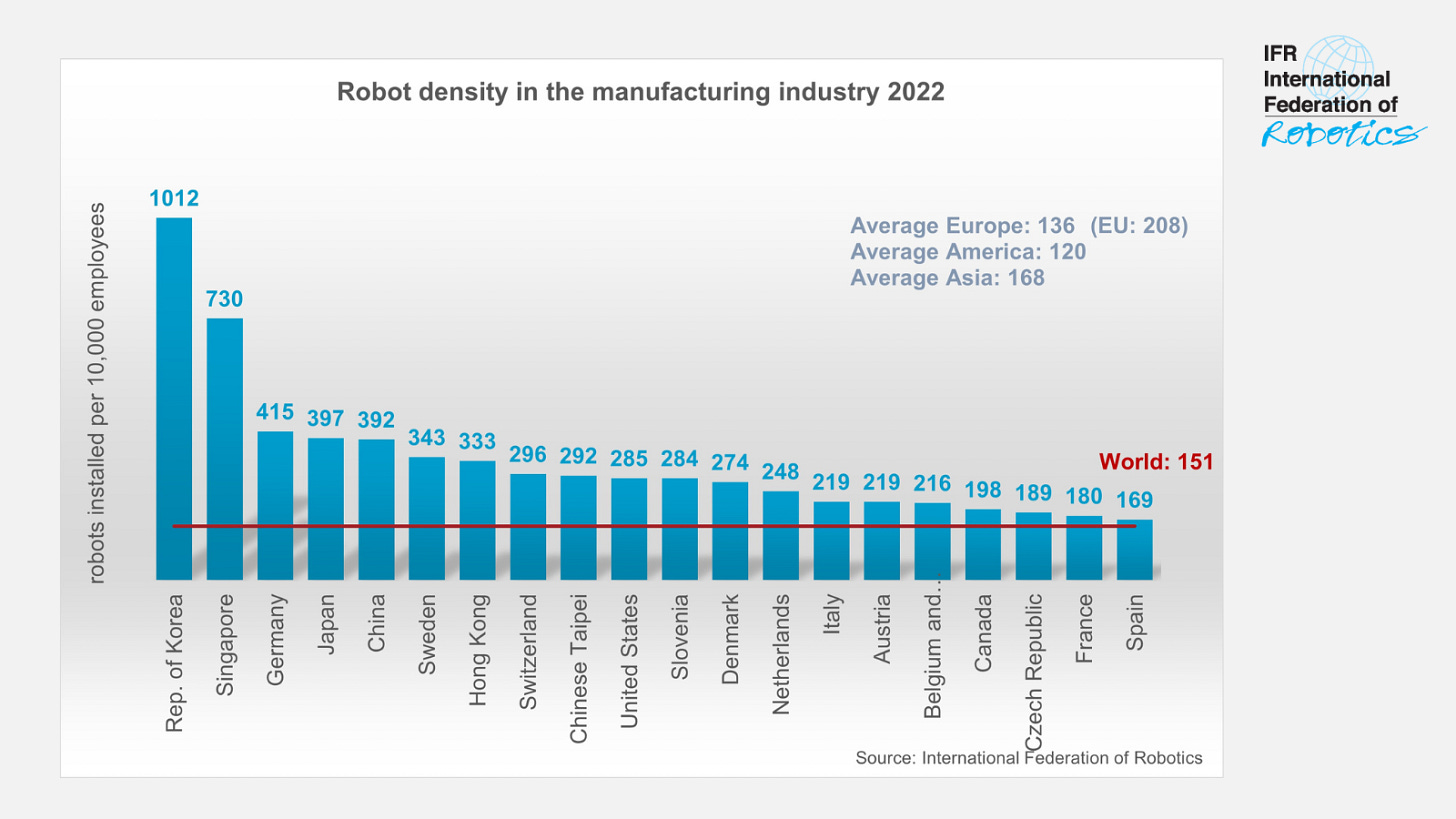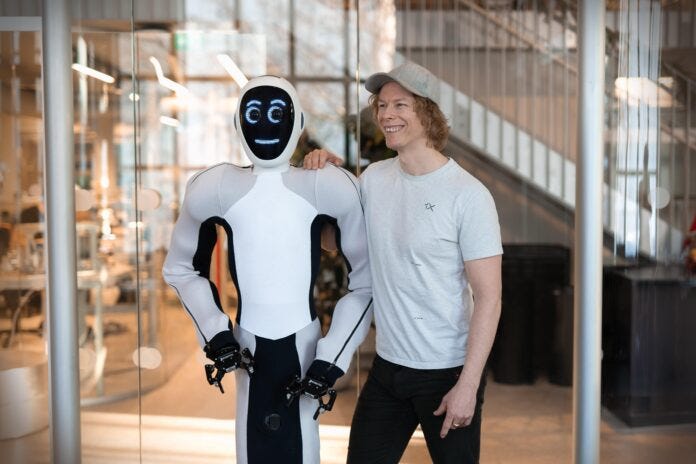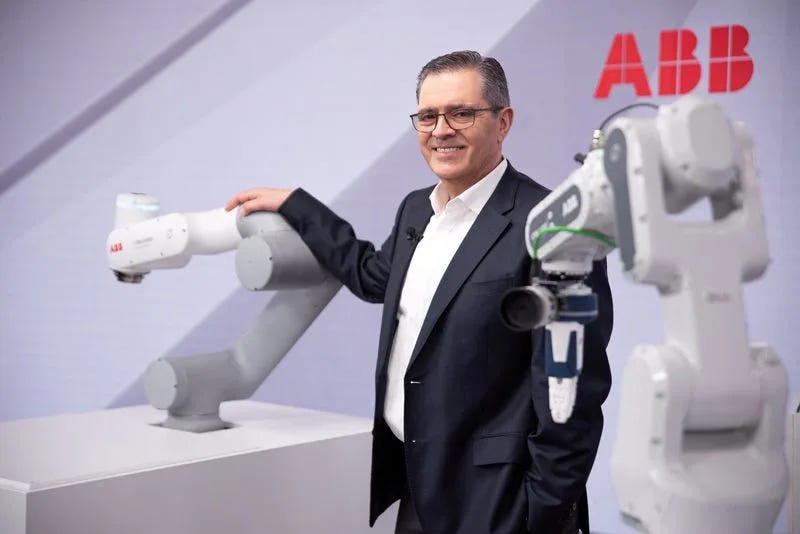The New Year Is Here, So what do you think you're going to do about it?
Is 2024 going to be 2023 v2.0 or something new?
Aaron’s Thoughts On The Week
Drop the last year into the silent limbo of the past. Let it go, for it was imperfect, and thank God that it can go. - Unknown
Well, here we are - 2024!
Everyone starts the year with their hopes and plans for the new year. Sometimes it works out, and sometimes it doesn’t. Ultimately, though, if you plan for great things, you are more than likely to accomplish them versus not accomplishing anything.
As for me, I got some “interesting” plans, to say the least!
First, let’s discuss my job as Director of Robotics and Autonomous Systems Programs at ASTM International. There are many things in the works, some that I can talk about and some (for obvious reasons) I can’t. One clear thing is that the F45 Committee on Robotics, Automation, and Autonomous Systems will probably publish the most standards they have ever done in a single year. In 2023, the committee launched two new subcommittees. One focused on Grasping and Manipulation, while the other focused on Legged Robots. Both are on track to deliver their first standards in 2024.
Also, in 2024, I am looking at another big travel year with numerous trips around the globe as we continue to do outreach to different areas of the robotics industry. I am especially excited about ICRA this year. Not only will it mean a return to Japan, but ASTM is sponsoring one of their first robotics challenge with a grasping and manipulating challenge that we are partnering with NIST on. Travel can wear one down, but it is well worth it when you get to talk and listen to some of the most amazing people in the industry. If you are wondering where I may be, look at the calendar of events at the bottom of this newsletter.
As for what is in store for Six Degrees of Robotics, it will also be an interesting year. First, Six Degrees has grown at a rate I did not anticipate. At this point (I thought), we should have a small following, and doing this weekly newsletter would be plenty for now. Boy, was I wrong!!
As many of you may have noticed, we launched a new series called “Six Questions With,” where we present six questions to an expert in their area of robotics. Thank you to the amazing Vanessa Loiola for being our first guest. We already have the next guests in the pipeline, so expect a new installment with a new expert every Tuesday.
We also got ourselves a new mascot known as VI, pronounced Vee. If you wonder why we named the little guy VI, look at the name closely. And yes, VI will be making his appearance in future projects.
While there is a lot ahead in 2024, I am really looking forward to it. There are plenty of challenges ahead, but new opportunities to do amazing things come with those challenges. I hope you all are looking forward to the ride as much as I am.
Robot News Of The Week
IFR: world sets record for operational robots in 2022
According to the latest World Robotics report from the International Federation of Robotics (IFR), there were a record-breaking 3.9 million operational robots in the world in 2022. The report also contains details about robot density across the globe. Robot density is calculated by measuring the number of operational industrial robots per 10,000 employees in a given country.
Marina Bill, President of the IFR, said "Robot density data reveal the state of automation worldwide and allow us to compare regions and countries. The speed of robotics adoption in factories worldwide is impressive: the new global average robot density hit an all-time high of 151 robots per 10,000 employees - more than double the number measured only six years ago."
If you thought 2023 was the year of humanoid robots, 2024 has entered the chat.
1X, an AI and robotics company, has raised €91 million in Series B funding with EQT Ventures and other notable global investors. The company plans to use the new capital to launch NEO, its second-generation android. NEO is designed as a bipedal humanoid and is tailored to provide versatile support for a wide range of domestic tasks in the consumer market. The funds will also support the company’s existing enterprise clients in logistics and guarding. With 1X offering a safe android to work among people and a new approach to embodied learning for data collection, the company is at the forefront of AI robotics.
Dextrous Robotics shuts down trailer unloading business
Unfortunately, as one robot firm celebrates, another one has to shut its doors.
A startup called Dextrous Robotics, which was based in Memphis and had developed a robot similar to chopsticks to unload boxes from trailers has ceased operations. The company was founded in 2019 by Evan Drumwright and Sam Zapolsky, and dissolved in late December 2023. Despite raising approximately $8 million in funding since its inception, Dextrous was unable to secure further funding to begin production of the commercial version of its DX-1 robot.
ABB buys tech company to give industrial robots eyes and brains
2024 did not take long to get the acquisition train going again!
ABB, a technology company, has acquired Sevensense, a Swiss start-up that specializes in enhancing the mobility of industrial robots by using 3D vision and artificial intelligence. The acquisition is the latest move by ABB to invest in robotics, driven by the increasing demand for industrial robots that can function and move independently. Sevensense, based in Zurich, develops and manufactures AI systems and sensors to provide factory robots with the eyes and brains needed to navigate around plants while carrying components to production lines.
Robot Research In The News
Soft robotic, wearable device improves walking for individual with Parkinson’s disease
Researchers at Harvard University and Boston University have developed a wearable robotic suit to help Parkinson's patients walk more smoothly. The device, worn around the hips and thighs, gives a gentle push to the hips, lengthening the stride and preventing "freezing," a common and debilitating symptom of Parkinson's disease that causes a person to suddenly lose the ability to move their feet, often resulting in falls.
The team spent six months working with a 73-year-old man who suffered from freezing episodes more than ten times a day despite having surgical and pharmacologic treatments. However, after switching on the device, the man could walk faster, further, and more smoothly, eliminating freezing. The robotic garment uses cable-driven actuators and sensors worn around the waist and thighs, and algorithms estimate the phase of the gait and generate assistive forces with muscle movement.
“We found that just a small amount of mechanical assistance from our soft robotic apparel delivered instantaneous effects and consistently improved walking across a range of conditions for the individual in our study,” said Conor Walsh, professor of engineering and applied sciences at Harvard.
“Because we don’t really understand freezing, we don’t really know why this approach works so well,” said Terry Ellis, professor and physical therapy department chairman at Boston University. “But this work suggests the potential benefits of a ‘bottom-up’ rather than ‘top-down’ solution to treating gait freezing. We see that restoring almost-normal biomechanics alters the peripheral dynamics of gait and may influence the central processing of gait control.”
Multiple AI models help robots execute complex plans more transparently
Your daily to-do list typically consists of simple tasks like washing dishes and buying groceries. You probably won’t break down each step of the task, such as "pick up the first dirty dish" or "wash that plate with a sponge," because they feel intuitive to you. However, robots require a more detailed plan that involves a complex outline. To assist them, MIT's Improbable AI Lab has developed a new multimodal framework called Compositional Foundation Models for Hierarchical Planning (HiP), which creates detailed, feasible plans using the expertise of three different foundation models. These foundation models, like OpenAI's GPT-4, are trained on massive amounts of data for applications such as generating images, translating text, and robotics.
Robot Workforce Story Of The Week
Houston Community College first in Texas to offer artificial intelligence, robotics degrees
In late 2023, Houston Community College (HCC) became the first community college system in Texas to offer both associate and bachelor's degrees in the fields of artificial intelligence and robotics. The announcement was made by Samir Saber, who serves as the dean of the Digital & Information Technology Center of Excellence at HCC. According to Saber, HCC is only the second community college institution in the United States to offer this program, shortly after Chandler-Gilbert Community College in Arizona did so in October. To accommodate the program, HCC is planning to expand its lab space soon.
Robot Video Of The Week
Figure's Brett Adcock claimed a "ChatGPT moment" for humanoid robotics on the weekend. Now, we know what he means: the robot can now watch humans doing tasks, build its understanding of how to do them and start doing them entirely autonomously…starting with how to make coffee.
Upcoming Robot Events
Jan. 15-17 A3 Business Forum (Orlando, FL)
Mar. 11-14 ACM/IEEE International Conference on Human Robot Interaction (Boulder, CO)
Mar. 11-14 MODEX (Atlanta, GA)
Apr. 7-10 Haptics Symposium (Los Angeles, CA)
Apr. 14-17 International Conference on Soft Robotics (San Diego, CA)
May 1-2 The Robotics Summit & Expo (Boston, MA)
May 6-9 Automate (Chicago, IL)
May 13-17 IEEE-ICRA (Yokohama, Japan)
July 2-4 International Workshop on Robot Motion and Control (Poznan, Poland)
July 8-12 American Control Conference (Toronto, Canada)
Oct. 1-3 International Robot Safety Conference 2024 (Cincinnati, OH)
Oct. 8-10 Autonomous Mobile Robots and Logistics 2024 (Memphis, TN)
Oct. 16-17 RoboBusiness (Santa Clara, CA)
Oct. 28-Nov. 1 ASTM Intl. Conference on Advanced Manufacturing (Atlanta, GA)








